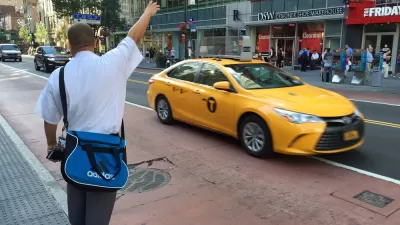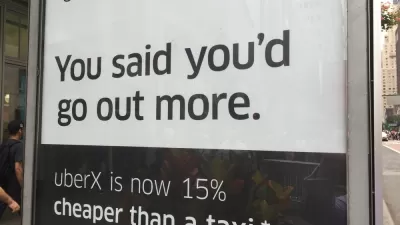There are two schools of though t when it comes to whether Uber and other companies like it are making traffic better or worse. A new study by new York City will endeavor to clear the air.
Carl Bialik takes an in-depth, data-focused look at the congestion implications of transportation network companies like Uber—especially in light of the recent controversy in New York City when Mayor Bill de Blasio proposed a cap on the number of "for-hire" drivers in the city.
After noting that the "city will move ahead with a four-month study of the for-hire industry, examining how it has affected traffic, air quality, noise and public health," Bialik examines the spotty and unreliable data currently available about the impacts of Uber. So, for instance, fewer cars are entering Manhattan, but the cars that are there are traveling much slower.
Bialik notes that both the cities data and Uber's data are murky. The article cites traffic models by Charles Komanoff (who believes that Uber is contributing to worsening congestion in the city, but acknowledges a "very big 'if'"). On the other side is Mark Kleiman, professor of public policy at New York University’s Marron Institute of Urban Management, who thinks that "[e]verybody’s making up stories about how Uber might be bad… but apparently those stories don’t require any evidence whatsoever."
FULL STORY: The Debate On Uber’s Impact In New York City Is Far From Over

Alabama: Trump Terminates Settlements for Black Communities Harmed By Raw Sewage
Trump deemed the landmark civil rights agreement “illegal DEI and environmental justice policy.”

Planetizen Federal Action Tracker
A weekly monitor of how Trump’s orders and actions are impacting planners and planning in America.

Why Should We Subsidize Public Transportation?
Many public transit agencies face financial stress due to rising costs, declining fare revenue, and declining subsidies. Transit advocates must provide a strong business case for increasing public transit funding.

Judge Orders Release of Frozen IRA, IIJA Funding
The decision is a victory for environmental groups who charged that freezing funds for critical infrastructure and disaster response programs caused “real and irreparable harm” to communities.

‘Clybourne Park’ Sets Stage for Housing Equity Discussions
Clybourne Park, a play exploring race, real estate, and community tensions, can set the stage for discussion on the lasting impacts of housing discrimination, gentrification, and the fight for affordability.

Understanding Road Diets
An explainer from Momentum highlights the advantages of reducing vehicle lanes in favor of more bike, transit, and pedestrian infrastructure.
Urban Design for Planners 1: Software Tools
This six-course series explores essential urban design concepts using open source software and equips planners with the tools they need to participate fully in the urban design process.
Planning for Universal Design
Learn the tools for implementing Universal Design in planning regulations.
Caltrans
Smith Gee Studio
Institute for Housing and Urban Development Studies (IHS)
City of Grandview
Harvard GSD Executive Education
Toledo-Lucas County Plan Commissions
Salt Lake City
NYU Wagner Graduate School of Public Service




























